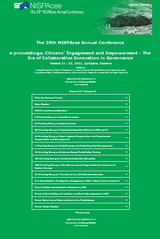EVENTS from Other Institutions
Monitoring and Evaluation of EU Structural and Cohesion Funds programmes, 2021-2027
June 4, 2024 - June 6, 2024
Venue: Prague (CZ)
Organizer(s): European Institute of Public Administration (EIPA)
Language: English
Contact: Programme Organiser
Claire Lahaye
Tel: +31 43 3296277
c.lahaye@eipa.eu
Info link: https://www.eipa.eu/courses/eu-structural-cohesion-funds/
Many Programme Authorities continue to conduct evaluations of their 2014-2020 programmes and projects, as well as planning evaluations for the 2021-2027 period. Are Managing Authorities collecting the best possible monitoring and evaluation data? Are they clear about how to measure the impact of interventions and what evaluation methods to use – theory-based or counterfactual? Are they considering ex-post CBA?
Member State Recovery and Resilience Fund plans are being implemented rapidly. How do their monitoring procedures and data needs differ from Cohesion Policy?
What will you learn:
This face-to-face course in Prague is over 3 days:
Day 1 deals with the new monitoring and reporting requirements, the choice of programme indicators, data challenges and using the new Performance Framework. Helena Barbořáková, a highly experienced Czech Ministry official, will assess the lessons learnt from 2014-2020 and the implications of the new requirements for programmes in 2021-2027.
We will also review a selection of new Programmes and look at the Reporting template for the new Structural Funds programmes, highlighting the special link between finance and performance, and how will you report programme progress.
We look at how RRF plans in Member States will be monitored and evaluated
In Days 2 & 3 we examine the contents of Evaluation Plans and how to conduct impact evaluations (and “evaluations during the programming period”). Dr. Vladimir Kváča, a leading evaluation consultant-economist, will help us plan realistic evaluations – ones that are useful for evaluation stakeholders. He will consider the appropriate timing of evaluation studies and the implications for data gathering. We will review the two recommended broad evaluation methods – theory-based and counterfactual evaluations – and the choices for project / programme evaluations on the ground.
We will also describe how to complete an ex post cost-benefit analysis (ex post CBA) for infrastructure and other large projects.
Finally, we will consider how best to manage evaluation studies, including preparation of the Terms of Reference, aspects of fieldwork, and typical live issues for your current / planned evaluations.




 Price:
Price: 









